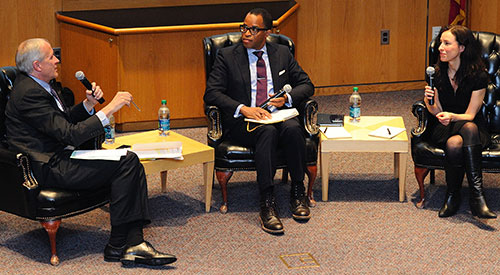
On a day surprisingly full of news about Edward Snowden, Fordham Law’s Center on National Security and PEN American Center added to the conversation on Jan. 23 by hosting a debate on the fugitive’s future.
The panel pitted competing views of The New Yorker journalist Amy Davidson against those of Jonathan Capehart of The Washington Post. David McCraw, assistant general counsel for The New York Times, moderated the discussion.
The debate took place within hours of Snowden’s live Q&A on the website www.freesnowden.is, in which he directly addressed the question “Under what conditions would you agree to return to the U.S.?” His answer: “The 100-year old law under which I have been charged . . . was never intended to be used against people working in the public interest, and forbids a public interest defense. This is especially frustrating, because it means there’s no chance to have a fair trial—and no way I can come home and make my case to a jury.”
Conditions for Snowden’s return to the United States emerged as the primary focus of the evening’s discussion. Coincidentally, earlier in the day politicians from both parties began to seriously consider negotiations, which some said should include clemency.
U.S. Attorney General Eric H. Holder Jr. said Snowden must plead guilty before any such negotiations could begin.
“We wouldn’t be talking about clemency if he hadn’t committed a crime,” said Davidson, who noted that “pardon, clemency, and plea bargaining are not terms that we have to invent for this case.”
But she also said “if we think there’s benefit [to]interrogating him, then Moscow is not the best place to have him.”
Capehart concurred that Snowden should return, but he was not warm to the idea of clemency, frequently repeating that the former government contractor must be held accountable. He said he had a hard time believing that there were not other channels available for Snowden to take the sensitive information—rather than the press. He specifically suggested members of Congress.
As it stands now, Capehart said, the federal government doesn’t know what other information Snowden is in possession of, even though Snowden claims he has no other files.
“Shouldn’t we be concerned about what happened when he was in Hong Kong and in the airport in Russia? And what those respective government officials did?” he asked.
Davidson argued that going to a government official or congressman likely would have prevented a national conversation on the National Security Administration’s [NSA] overreach and illegal eavesdropping.
“If he’d immediately turned himself in, we wouldn’t have heard a word he said about [his]motives,” she said.
Panelists agreed that the 35-year prison sentence given to Chelsea Manning, the former Army private who released the largest set of government documents ever leaked, hovers over the Snowden affair. Davidson said that giving “slightly random young people” security access is just one of the many aspects of the case that suggests mismanagement on the part of the Congress.
“Congress failed and was failed [by the NSA]in terms of disclosure and oversight,” said Davidson.
Panelists also noted that President Obama himself had acknowledged in The New Yorker that “legitimate policy questions” have been raised by the Snowden leaks. But the president questioned whether “giving some 29-year-old free reign to dump a mountain of information” was the best way to start the conversation.
Davidson said the security breach reveals more than just policy concerns.
“[True], the NSA has compromised the Constitution, but more importantly they’ve been clumsy,” she said. “And that’s good to know.”
View a video of the panel discussion here.
]]> Glenn Greenwald, the journalist who Edward Snowden turned to when he leaked documents about the National Security Agency’s top-secret surveillance programs, will join a panel of experts on Thursday, Nov. 14 for a discussion at Fordham Law School titled “They’re Watching Us: So What?”
Glenn Greenwald, the journalist who Edward Snowden turned to when he leaked documents about the National Security Agency’s top-secret surveillance programs, will join a panel of experts on Thursday, Nov. 14 for a discussion at Fordham Law School titled “They’re Watching Us: So What?”
For the discussion, which will be held from 7-8:30 p.m. at the McNally Amphitheatre, the Center on National Security has also lined up:
-James Bamford, author of The Shadow Factory: The NSA from 9/11 to the Eavesdropping on America (Anchor, 2009);
Chief among the issues they will be tasked with addressing is what we know—and don’t yet know—about how surveillance is reshaping our public and private lives.
The panel will be moderated by Suzanne Nossel, Executive Director of PEN American Center, and will also try to answer questions such as:
What effect is the expansive American surveillance state having on us?
Are the programs that Snowden revealed inhibiting the way we think, speak, and create, distorting social interactions, damaging individuals or communities?
The discussion will be live-streamed at http://www.pen.org/event/2013/10/25/theyre-watching-us-so-what
For more information and to RSVP, visit http://centeronnationalsecurity.org/node/835, or e-mail [email protected]
—Patrick Verel

What does it mean to live in a surveillance state? The Al Jazeera America program, Fault Lines, investigates the fallout over the National Security Agency’s mass data collection programs in the U.S. and abroad.
Ethics expert, Celia Fisher, Ph.D., the Mary Ward Doty Endowed University Chair and Professor of Psychology, is featured in the program, which premieres on Al Jazeera America on Friday, Nov.1, at 10:30 p.m. ET. The program will repeat on Al Jazeera America on Nov. 2, at 7p ET, and then air on Al Jazeera English on Nov. 6, at 6:30p ET.
In the episode, Fisher discusses the psychological effects and ethical implications of surveillance. The program will also feature in-depth interviews with journalist Glenn Greenwald and NSA director Keith Alexander.
– Gina Vergel
]]>